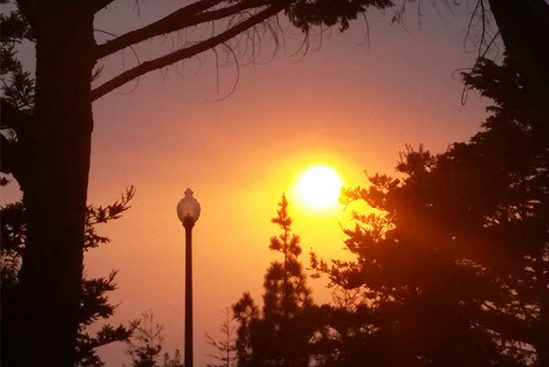How UC Berkeley will respond to wildfire smoke
Campus leaders share information on preparedness actions, health considerations and resources

October 23, 2019
Anna Harte, UC Berkeley’s medical director, Patrick Goff, head of environment, health and safety, and Alicia Johnson, director of Berkeley’s Office of Emergency Management, sent the following message to the campus community:
Based on our experience with wildfires in Northern California in the fall of the last two years, and as reinforced by recent events, we can reasonably expect that heavy smoke may impact campus again. We write today to share information on preparedness actions, health considerations and resources.
When wildfire smoke threatens our community, UC Berkeley monitors air quality and provides updates on the Air Quality Index (AQI) and actions. Though we will list campus actions, you must make decisions on what you feel is best for yourself and family. You can monitor AQI at www.AirNow.gov.
Health Effects
During smoke events, fine particulates suspended in air are the main harmful pollutant. Sensitivity varies among individuals. Symptoms individuals might experience include: lung irritation, persistent coughing, phlegm, wheezing, or difficulty breathing. More serious health effects can include reduced lung function, bronchitis, worsening of asthma, heart failure and early death. You are encouraged to see your medical provider if you experience any of these symptoms or are sensitive to smoke.
As a reminder, when air quality worsens, it is best to take steps to limit exposure. If you must be outside, minimize strenuous activity. To the extent possible, stay indoors where air is filtered and keep windows and doors closed. UC Berkeley has identified facilities with better filtration systems that may be utilized by those seeking cleaner air: A list of those locations, along with other regularly updated information, is found on our Wildfire Smoke / Air Quality resource page. You may also consider purchasing a portable air cleaner with HEPA filtration to reduce particulate exposure in a specific room or space.
As a last resort, and only if you MUST be outside, consider using a N-95 respirator after consulting with your physician. Particulate respirators such as N-95 masks may filter out some of the particulate matter, but they do not filter harmful chemicals found in smoke, and are proven to provide protection only if individually fitted by a trained technician. While they may provide limited particulate filtration and comfort for those sensitive to the smoke, they can also increase the work of breathing, which can be harmful for people with significant underlying heart or lung conditions.
Campus Actions
When the AQI exceeds 150, UC Berkeley will notify our community of the situation via CALmessage and either reassign employees who work outdoors for more than one hour per shift, or make available N-95 respirators for voluntary use by outdoor workers and those employees who work in unfiltered buildings. A list of buildings with unfiltered air is provided on our Wildfire Smoke / Air Quality resource page.
When the AQI exceeds 200, UC Berkeley will suspend outdoor work unless it is absolutely necessary, continue to provide N-95 respirators for voluntary use by outdoor workers and those employees who work in unfiltered buildings, cancel or restructure classes and delay, postpone or relocate outdoor athletic activities and events involving activity. Other curtailment of operations will also occur.
UHS has a limited supply of N-95 respirators for use in emergencies including but not limited to wildfires. Students with asthma and other underlying medical conditions that put them at high risk of adverse effects and who are experiencing symptoms related to air quality can be assessed, treated and receive respirators with instruction at UHS, while supplies last. However UHS strongly recommends that students, faculty, or staff in these high risk categories, and any who know they are sensitive to smoke, discuss the risks/benefits of N-95 respirators with their physician and consider purchasing one for personal use before an event occurs, as part of their personal emergency kit.
While these are the primary actions to be taken, a UC system-wide Air Quality Protocol Working Group has completed a decision-making matrix with recommended and required actions for specific thresholds of AQI.
For more information, useful links and updated information see our Wildfire Smoke and Air Quality resource page .
Be well and stay safe!
Anna Harte, MD
Medical Director
University Health Services
Patrick Goff
Executive Director
Environment, Health and Safety
Alicia Johnson
Director
Office of Emergency Management